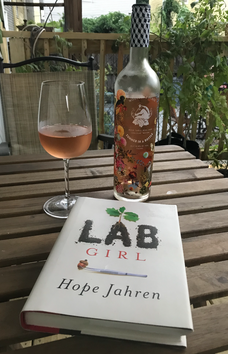Why this book?Hope Jahren's Lab Girl was a gift from my dad. I can't remember the year exactly, but it was long enough after it was published in April of 2016 to be 15% off at Barnes and Noble. I recently removed the sticker to make the book cover more photogenic. The glue is just visible in the upper right corner of the image shown here, alongside some of my favorite wine from Long Island. How the book stacked up:Based on the name she chose for her website, hopejahrensurecanwrite.com, Jahren has a certain confidence in her writing. While I can appreciate a bold domain purchase (see loser.com), I found her writing to be so excessively poetic that it sounded insincere. I eventually acclimated to the style, but the first few chapters were difficult to get through, and perhaps why I didn't get far the first time I picked up this book. Stylistic differences aside, Jahren's memoir resonated with me in two notable ways. Jahren recalled her years as a student with such insight and accuracy that, as someone fresh off of the academic biology pipeline, it was therapeutic to read. My favorite line from the book was Jahren's take on what made her a good science student as an undergrad: "my inability to let things go, coupled with my tendency to overdo everything." The sentiment is dead on, and her take on grad school, particularly the transition from student (doing what you are told) to scientist (telling yourself what to do), was similarly accurate. The next section of the book on Jahren's life as a junior professor also resonated with me, but in a different way. It reaffirmed that I didn't want that life. Jahren describes the struggle of first setting up a lab and the sheer amount of time she has to spend applying for grants- even stating that money is the number one thing scientist are worried about. She recounts not being able to pay her lab manager, Bill, a living wage, and taking a disastrous budget road trip to a conference across the country. Almost nothing about this part of Jahren's life sounded appealing, and even though it was the 90s, I don't believe much has changed for science funding. Lab Girl isn't just a memoir. In nearly alternating chapters, plant biology is weaved into the story. Sometimes, the connection to Jahren's life is subtle, and other times more apparent, as when the chapter on plant reproduction preceded the birth of her son. While I enjoyed the plant chapters, I am struggling now to remember anything specific I learned. I can't hold this against Jahren; it is well established that people are better at remembering human stories than scientific knowledge. Though it was so odd that I might prefer to forget, I have no trouble recalling the story of Jahren and Bill stashing some of Bill's hair in a tree and periodically going to visit it. Final ThoughtsLab Girl is genuine, brave, and honest. Jahren speaks openly about her mental illness and the sexism that she experienced throughout her career. Although I didn't love the writing style, and some anecdotes were strange (i.e., Bill's hair), Lab Girl is an important book for anyone trying to understand life in academic biology, especially for a woman.
Jahren's second book, The Story of More, was released earlier this year and discusses climate change and human activity. I'd like to read it eventually, but it won't be jumping to the top of the queue just yet.
3 Comments
|

 RSS Feed
RSS Feed
